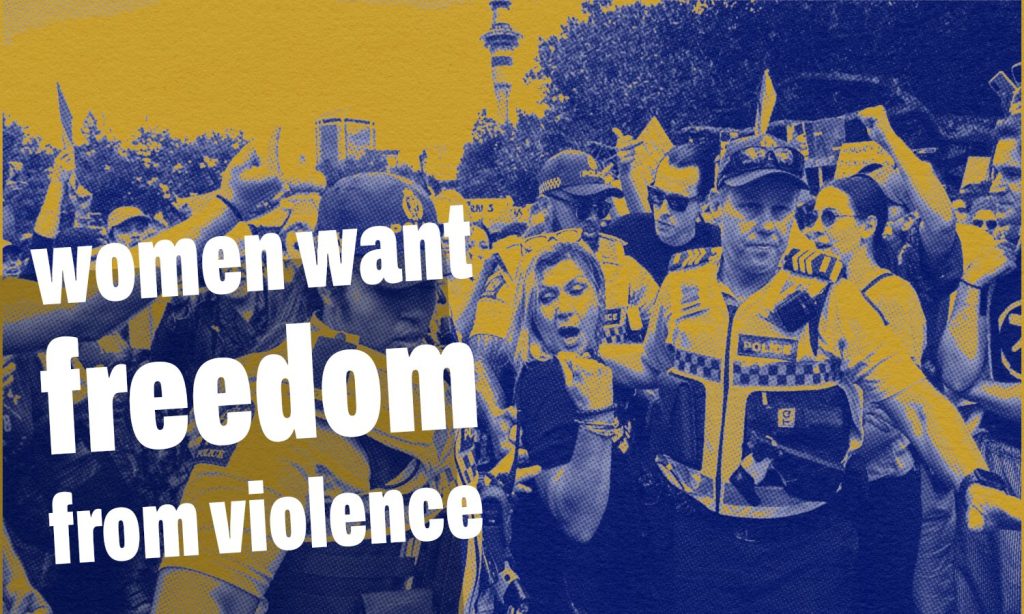A man who threw what turned out to be tomato juice at UK women’s rights advocate Kellie-Jay Keen and Tania Sturt, an organiser of the “Let Women Speak” event in Auckland’s Albert Park on 25 March last year, has been convicted of assault charges against the two and was discharged today [3 September].

The attack by Eli Rubashkyn sparked hundreds of angry protesters to push down barriers separating the protesters from those who came to Albert Park to hear from Ms Keen and to speak about threats to women’s rights they have experienced.
No one was able to speak because protesters used very loud noise and mayhem to shut down the event.
In the violence that followed, Ms Keen and her supporters had to physically force their way through the baying mob to exit via Princes Street where Police bundled Ms Keen into a car.
Later that night, Ms Keen left the country fearing for her life after death threats had been delivered to her hotel room. Police told her they couldn’t guarantee Ms Keen’s safety.
Ms Keen said on Twitter that day: “My activism is simple, we #LetWomenSpeak. Why does that make anyone so angry? We showed the world what happens to women when they try to speak. No one can pretend they don’t see the salivating misogyny.”
The violence against mainly older women sent a shock wave throughout New Zealand, especially when video footage emerged of a young man among the protesters repeatedly punching a 71-year-old woman in her face. He was later discharged without conviction.
Women’s Rights Party Co-leader Jill Ovens says Albert Park lifted the veil over extreme misogyny, which has been flourishing largely underground in on-line spaces, both internationally and here in New Zealand.
Ms Ovens says protesters have been targeting events organised to highlight women’s sex-based rights. The protesters try to shut down the events and intimidate women attending the events.
“On Suffrage Day last year, a group of mainly men hunted us down as we moved from Midland Park in downtown Wellington where we were handing out cake in celebration of women winning the vote,” Ms Ovens says. “They followed us as we joined a lesbian visibility protest outside the Ministry of Women’s Affairs, and then to Parliament grounds where we had planned a symbolic Suffrage action.”
On 8 July this year, anti-women protesters entered Victoria University’s Rutherford House where they planned to shut down a seminar organised by the Women’s Rights Party with prominent women activists, including visiting Australian Sall Grover. Ms Grover was the defendant in the “Tickle v Giggle” case that hinged on the question of whether men, including men who identify as women, can be excluded from women-only on-line spaces.
University of Auckland senior lecturer Dr Chris Wilson said yesterday on Radio NZ that extreme misogynistic violence was increasing globally.
“The abuse that you see online appears to be increasing; there have been a growing number of violent events that appear targeted at women.”
Dr Wilson cited the Bondi Junction mall attack earlier this year as an example. New South Wales Police openly said the offender had focused on attacking women and avoided injuring men.
Dr Wilson told Radio NZ that he believed misogynistic threats against female leaders in New Zealand were increasing. “We saw with Jacinda Ardern the number of death threats; I think nine were actually brought to court,” he said.
Ms Ovens said when she and others raised concern with the Labour Women’s Council in 2022 about the extreme misogyny being targeted against then Prime Minister Jacinda Ardern, other Labour women MPs recounted increasingly violent threats they were also receiving.
Laura Bates, English author of “Men Who Hate Women” based on her undercover investigation of the “manosphere”, told Radio NZ’s Nine to Noon in 2020 that every time she appears in the media or at speaking events, she receives a torrent of abuse and death threats.
Within weeks of starting an “Everyday Sexism” project where women could share their experiences, Ms Bates was receiving around 200 rape and death threats in a single day from men graphically describing the different weapons they would use to disembowel her, and the order they would use them.
In June this year, a UK man was given a suspended prison sentence after he sent audio clips and chilling graphic details of how he wanted to kill author J. K. Rowling with a hammer. The man also threatened to kill UK Labour MP Rosie Duffield with a gun. The magistrate took the threats seriously, saying that while free speech was important, there was a line in the sand and the accused had gone well beyond that line.
The UK Government announced this week that it is considering classifying “extreme misogyny” as a form of extremism in its strategies to target harmful ideologies. Home Secretary Yvette Cooper has ordered a review of the UK’s counter-extremism strategy to include how best to tackle threats posed by hatred of women.
The Women’s Rights Party aims to win and protect women’s rights, including the right to speak freely, the right to peaceful assembly and association, and the right to be free from violence in all its forms.
